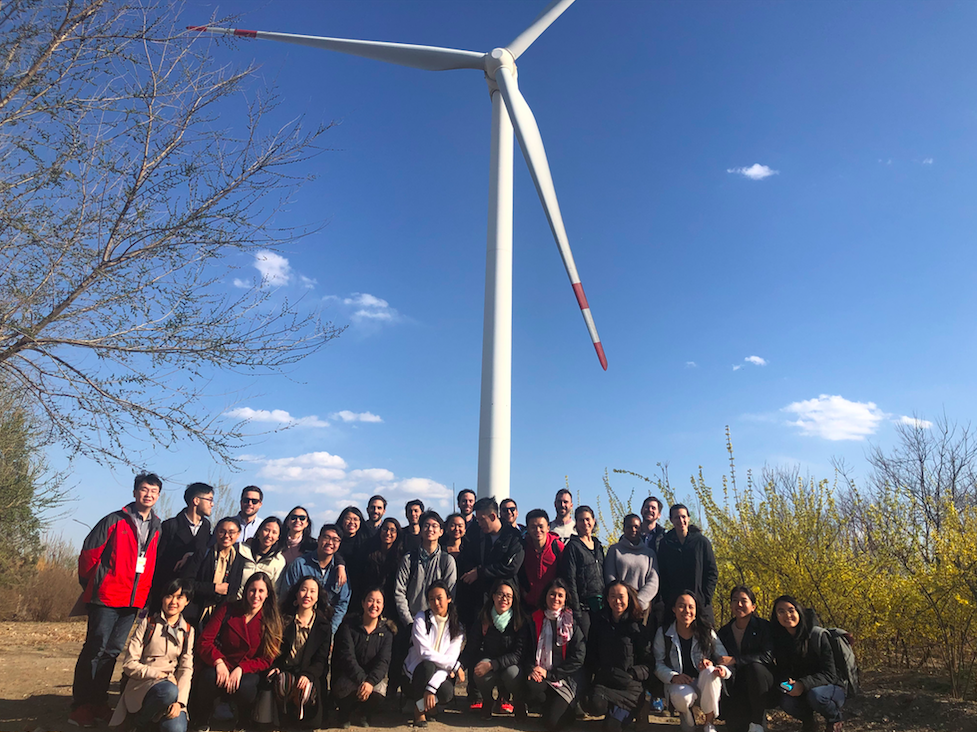
Students visiting Goldwind, one of China’s leading wind turbine manufacturers. Photo Courtesy of Tina Huang.
From March 20 to 24, 2019, Data-Driven Lab Director Dr. Angel Hsu led 32 students from Yale-NUS College and the Yale School of Forestry and Environmental Studies (F&ES) on a class trip to Beijing, China to experience China’s energy and sustainability challenges first-hand. This learning trip is part of Dr. Hsu’s semester-long joint class that virtually connects Yale-NUS and Yale F&ES students through weekly simultaneous seminar discussions covering a range of topics, from China’s electricity grid structure to how the country developed its renewable energy sector.
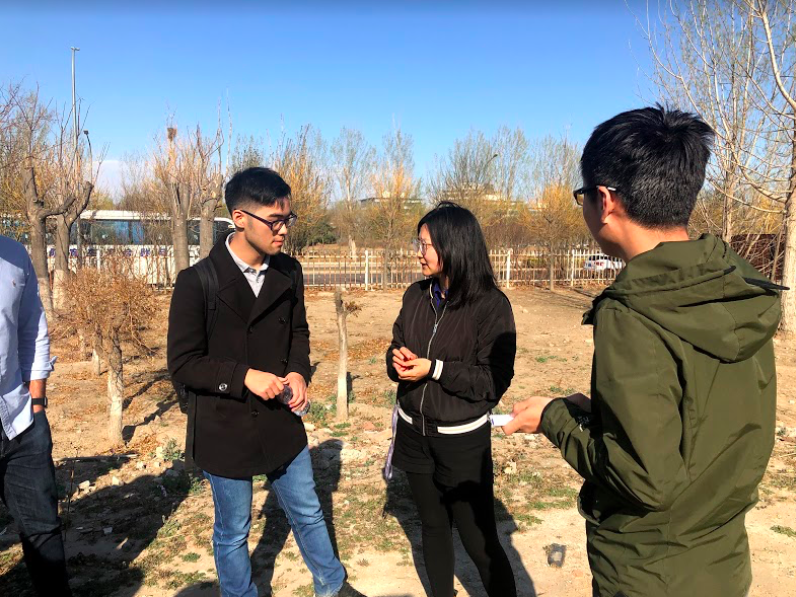
Students speaking to representatives from Goldwind, one of China’s largest wind turbine manufacturers. Photo Courtesy of Tina Huang.
Site visits and panel discussions allowed for students to engage directly with key actors in China’s environment, energy, and economic policy sectors. For example, the class visited SOHO China, a leading Chinese property company, to understand how the organization tracks its energy consumption and air quality to improve energy efficiency and attract sustainability-conscious clients. The class also visited JD.com, a leading Chinese e-Commerce company, to learn about how this Amazon competitor is utilizing state-of-the-art technology (think: delivery drones and automated warehouses) to improve efficiency in its supply chain. The company has also adopted cleaner vehicles for its deliveries and reduced the use of plastic packaging in its supply chain.
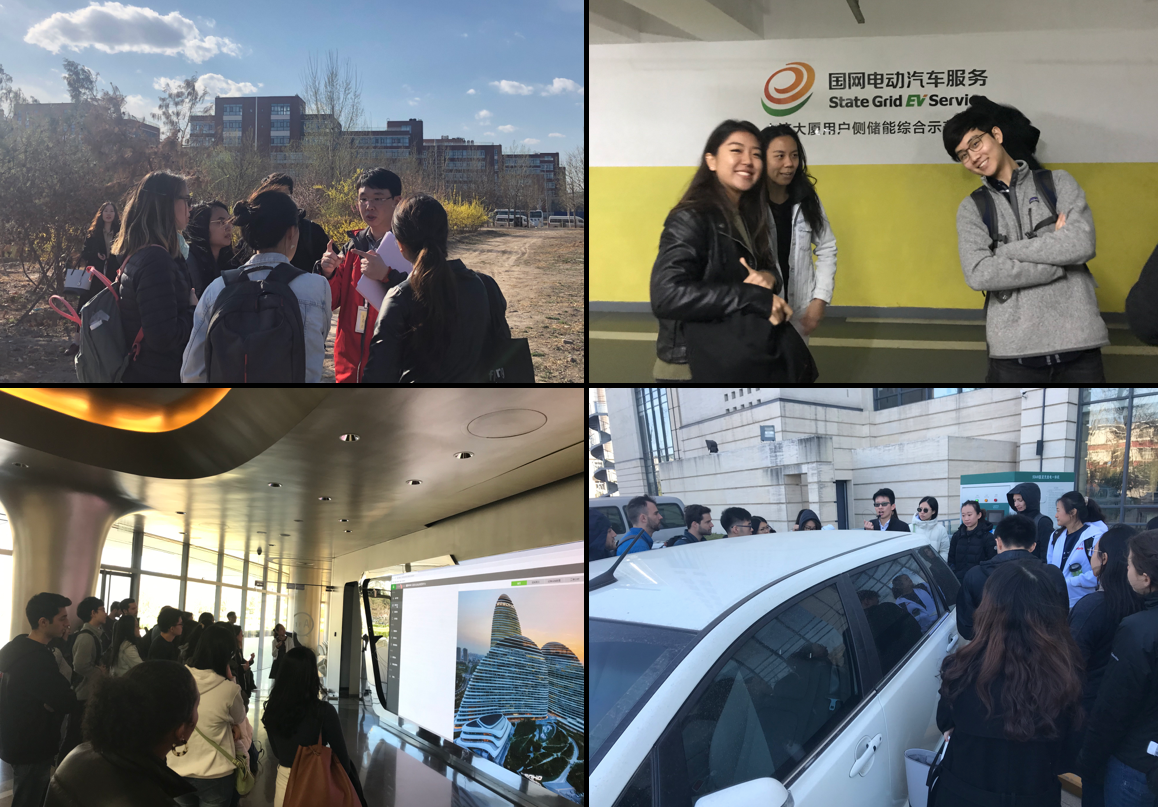
Students visit Goldwind, a State Grid battery storage demonstration project, and SOHO China to engage on energy and environmental issues. Photos courtesy of Dr. Angel Hsu.
Several panels held at the Yale Center Beijing allowed students to engage with a range of civil society groups and think-tanks addressing China’s environmental challenges. Such NGOs include NRDC, Greenpeace East Asia, and Shan Shui Conservation Center. One highlight was a conversation between Mr. Ma Jun, Director at the Institute for Public and Environmental Affairs (IPE) and one of China’s leading environmentalists, and Kate Logan, a Yale Masters of Environmental Management candidate who previously worked with Mr. Ma. IPE is perhaps best known for its creation of the China Water Pollution and Air Pollution Map, two public interfaces that display thousands of government-sourced pollution data and corporate violation records nationwide.
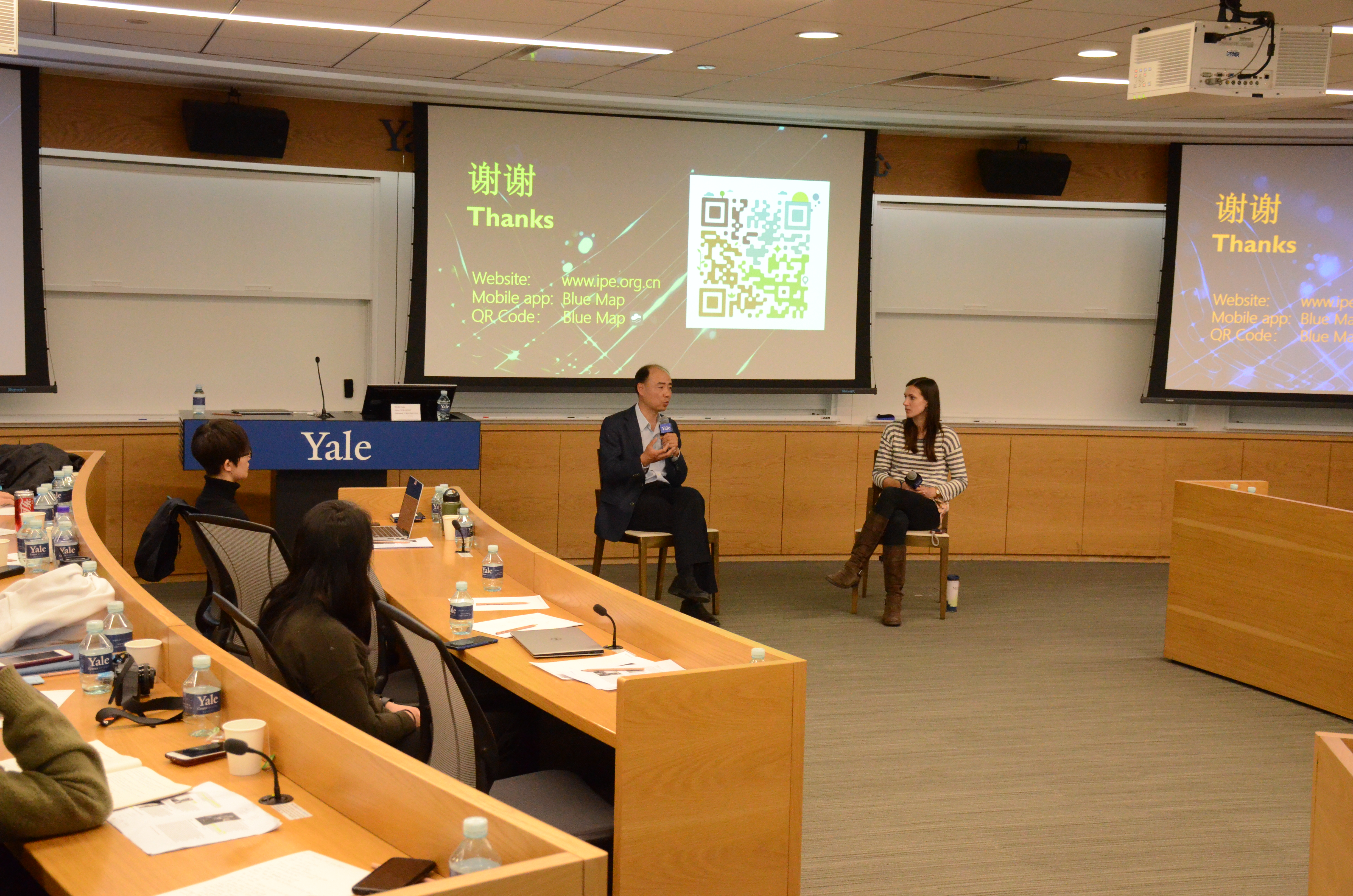
A discussion with Ma Jun, Director at the Institute for Public and Environmental Affairs (IPE), moderated by Kate Logan (F&ES ‘20), who previously worked for IPE. Photo Courtesy of Yale Centre Beijing.
On her experience, Kate Logan said, “I am honored to facilitate a dialogue with my former boss and environmental hero, Ma Jun, for my classmates. By consolidating publicly available data into a user-friendly mobile app to engage citizens, Ma Jun and IPE have motivated thousands of factories to openly address their environmental violations and improve their performance.”
“In particular, I think there is a lot to be learned from Ma Jun’s solution-oriented approach that aims to constructively partner with businesses, financial institutions, and other key stakeholders. He emphasized how issues such as capacity bottlenecks could potentially be overcome by leveraging open data and technology to scale up corporate environmental management efforts.”
Students were able to translate their experiences directly into opportunities. Fu Xiyao, a Yale-NUS College environmental studies major, found the NGO panel and Mr. Ma’s talk to be so inspiring that she was able to secure an internship with IPE’s green supply chain department to help assess Chinese companies’ greenhouse gas emissions and environmental management of their supply chain this summer.

Tsinghua, Yale, and Yale-NUS Students posing with one of Tsinghua University’s Electric Buses. Photo Courtesy of Shalia Narendran.
As a way of engaging peers who are also studying the environment, the class spent a half-day to exchange with counterparts in Tsinghua University’s School of the Environment, with which Yale FES has a joint masters degree program. Students had the opportunity to hear from two of Tsinghua’s leading experts on climate change and energy policy, Profs. Zhang Xiliang and Lu Xi. Afterwards, Yale-NUS, Yale, and Tsinghua students formed teams for an energy and climate scavenger hunt to discover for themselves Tsinghua University’s energy and environmental innovations on campus, including electric buses, recycling centers, and solar panels.
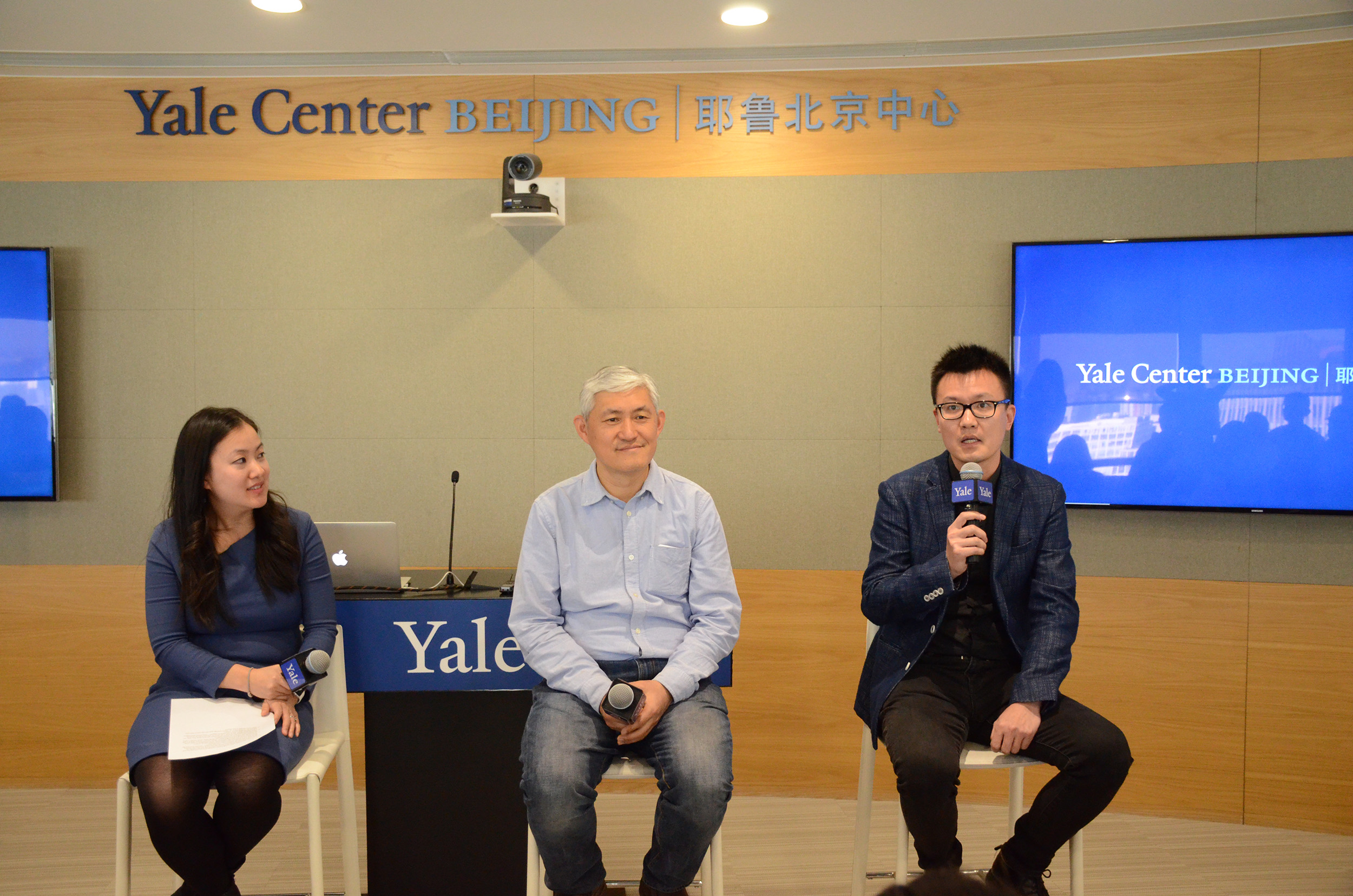
Dr. Hsu moderates a panel discussion on China’s energy and environment future with Dr. Jiang Kejun and Dr. Chai Qimin at Yale Centre Beijing. Photo Courtesy of Yale Centre Beijing.
After the activities at Tsinghua University, Dr. Hsu hosted a talk with Dr. Jiang Kejun, Director of Energy Research Institute at the National Development and Reform Commission (NDRC), and Dr. Chai Qimin, Director of International Cooperation at the National Centre for Climate Change Strategy and International Cooperation (NCSC) at Yale Centre Beijing. The discussion focused on China’s energy future and climate change leadership and challenges it faces to address rising greenhouse gas emissions and economic development. A key theme that emerged was China’s role in driving sustainability around the world.
Dr. Chai shared that China is suggesting it is in the “driver’s seat” and a “torch-bearer” for climate change, although it still has to work with other nations as equal partners to drive meaningful change through collective action. Dr. Jiang also noted the challenge of meeting energy and climate goals while achieving equity in economic development, a tension exemplified in residential electricity prices that are intentionally kept low to equitable provide access to electricity, but are not high enough to incentivize consumers to conserve energy.
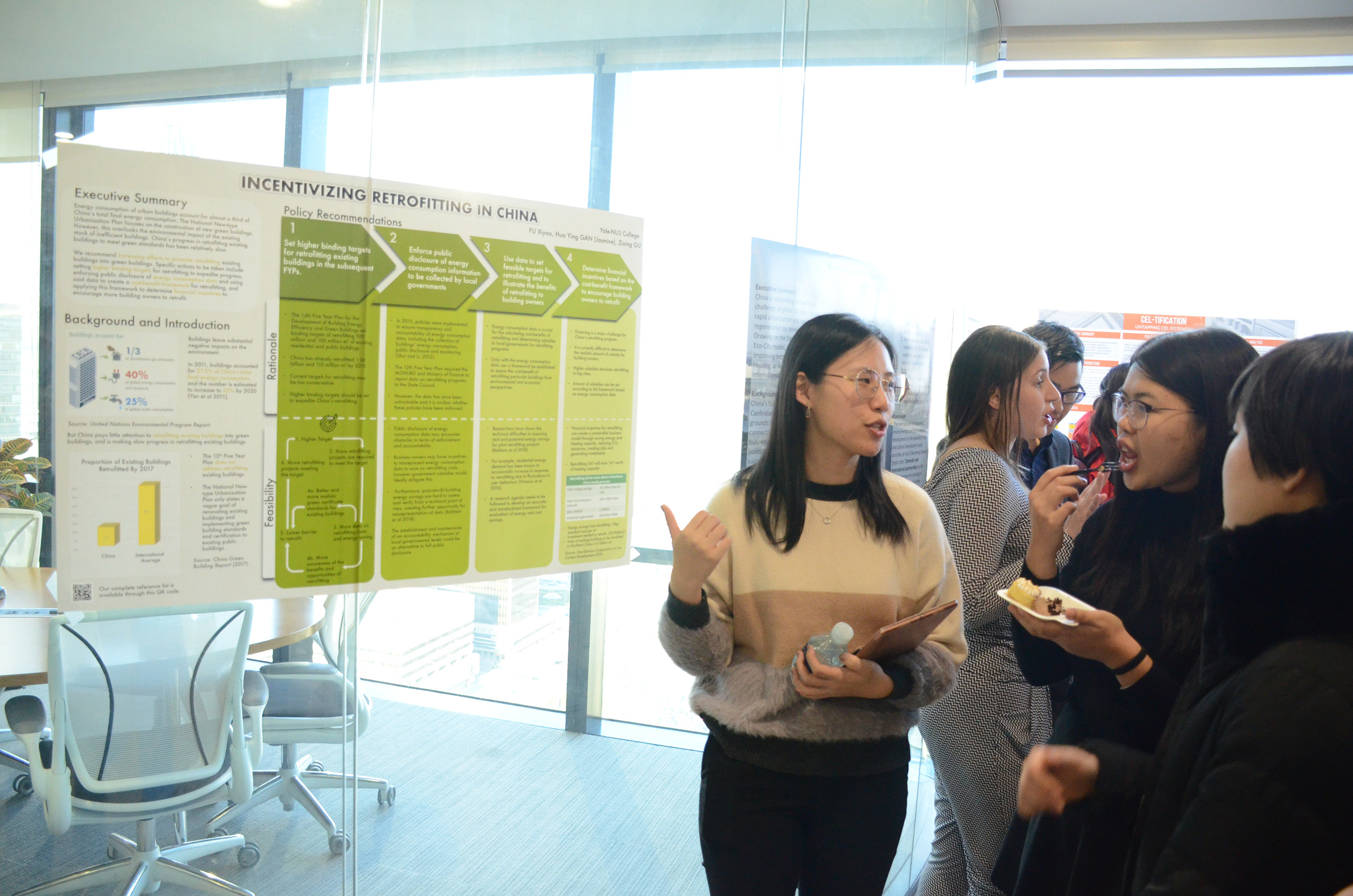
Students presented policy memos and posters making recommendations to address various aspects of China’s energy and environmental challenges to guests at the Yale Centre Beijing. Photo Courtesy of Dr. Angel Hsu.

The class meets with Ma Jun, Director at the Institute for Public and Environmental Affairs (IPE). Photo courtesy of Angel Hsu.
Tina Huang, the teaching assistant for the trip, and a student research assistant at Data-Driven Lab, reflected, “when planning for the field trip, Prof. Hsu and I reached out to organizations based on previous years’ experience and also based on current students’ requests. Things are always happening so fast on the ground in China, and I am glad to hear that students learned a lot by visiting sites and interacting with stakeholders.”
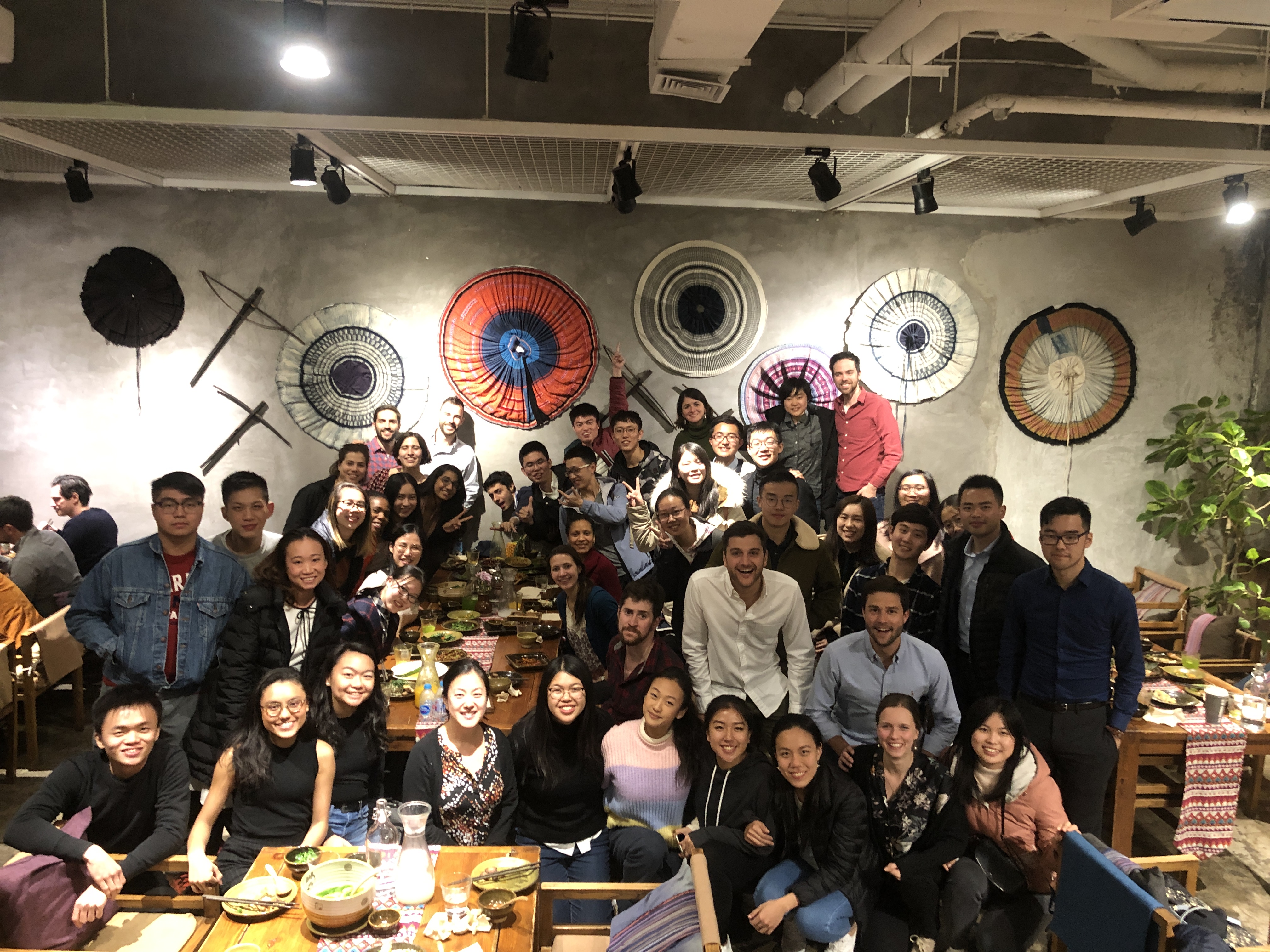
Students had the opportunity to exchange with Tsinghua university as part of the trip.

Recent Comments